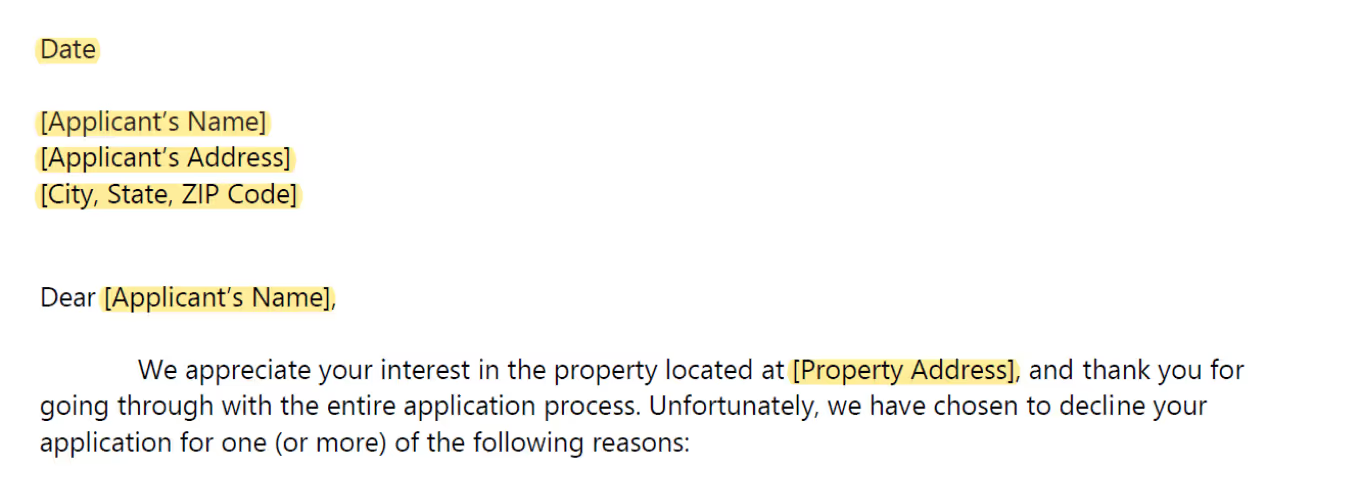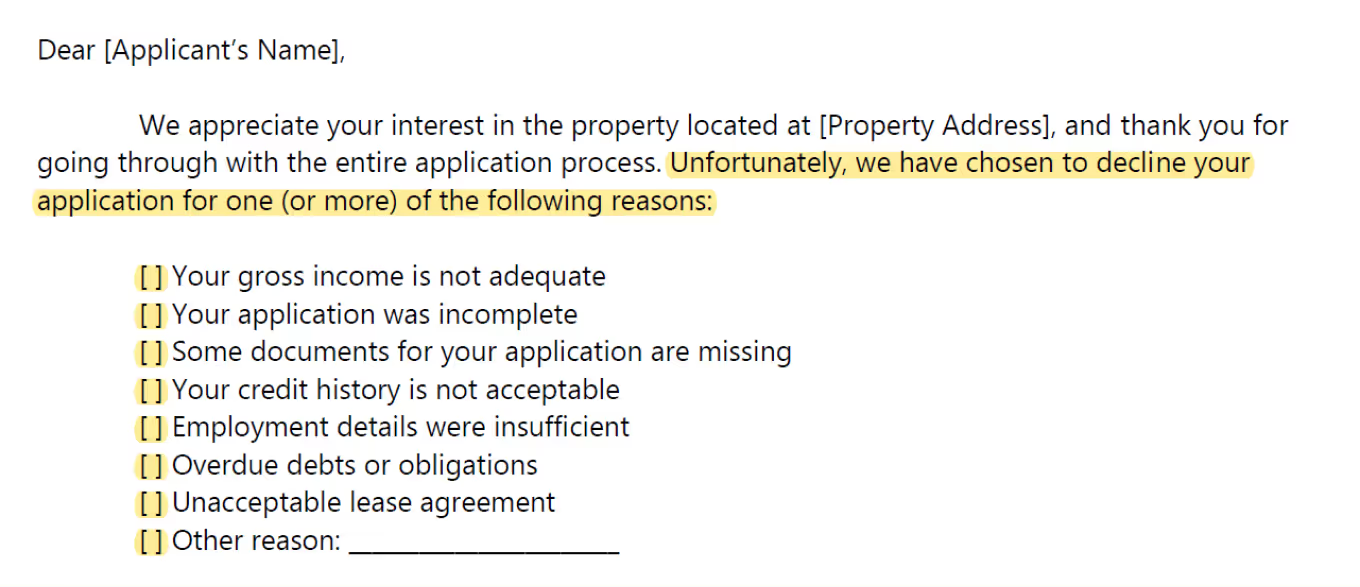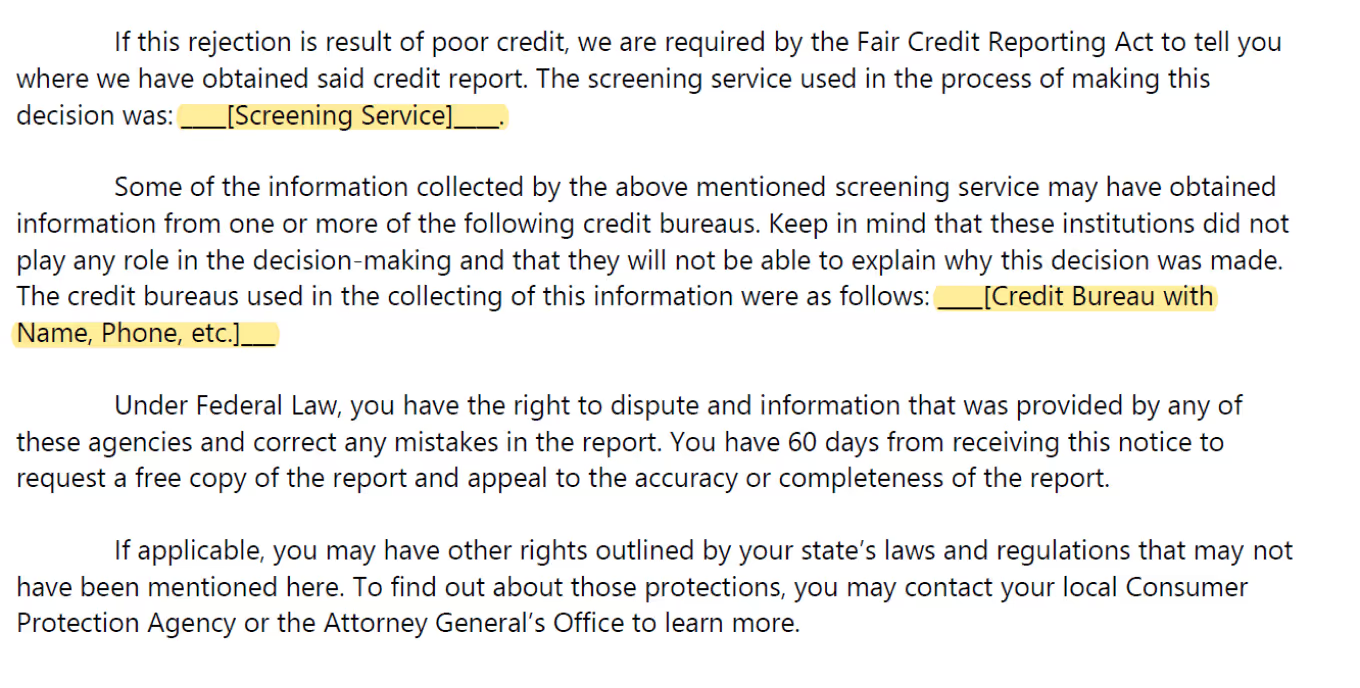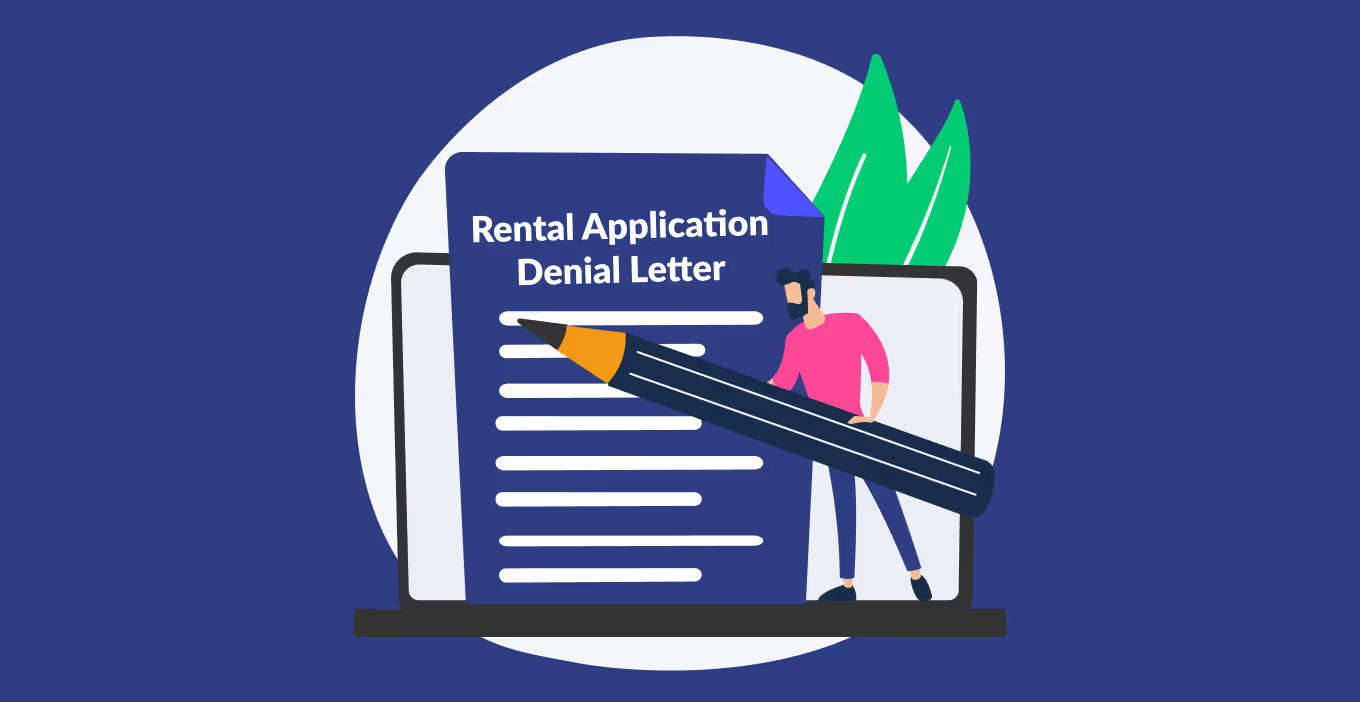When it comes to being a rental property manager, one of the many responsibilities that are included are having to choose whether or not to accept rental applications. Apart from that, the property managers also have to specify the reason for the sending of the tenant denial letter, or an adverse action letter.
In this guide, we will be discussing all of the parts of the tenant rejection letter, along with the reasons a landlord or property manager may have to send one. We will also discuss the protections that the applicants have when it comes to receiving an adverse action letter.
To begin, we are going to go over the basics of what it means to send a denial letter.
What is a tenant rejection letter?
In simplest terms, a tenant rejection letter is a formal document that is sent by a landlord or property manager that states to the applicant that their rental application for tenancy has been denied. Also called an adverse action notice, these notices could be given out for various reasons.
When writing a denial letter, it is important to keep in mind that it is a legal matter. This means that you must proceed legally, professionally, and justly. If this screening process is done incorrectly, it could result in legal retaliation by the recipient.
As long as the reasons are fair and legitimate, you can deny any one of your applicants. There are many different reasons to deny an applicant, and they are discussed in the next section.
Reasons to send a tenant rejection letter
When it comes to sending an adverse action notice or letter, there could be countless reasons to explain the decision. We have listed below some of the most common reasons to reject a tenant. We have also included some explanations as to why they would cause rejection.
Gross income inadequate
One of the most important duties of the tenant is to pay the correct rent in a timely manner. If the property owner concludes that the applicant does not make enough income, they can get rejected.
Generally speaking, the rent that a tenant pays should be about one-third of their total income. If the rent is higher than that, the person reviewing the rental application will have to dig deeper. Ultimately, this research is to find out whether or not they should rent to that applicant.
Incomplete/Inaccurate rental application
Another valid reason for a property owner to deny tenancy to an applicant is because their rental application was incomplete. Usually, this is done as a mistake and the property owner should reach out to the applicant first. However, the applicant may have purposely left some fields blank to try to hide something. If this is the case, the property owner has sufficient grounds to reject them.
Also, it is possible that the tenant provided information on the rental application that was untrue or was inaccurate. Again, this could be done by mistake and the applicant should be contacted to clear this up. If it was done on purpose, it is likely that the applicant will get denied.
Missing documents
When filling out a rental application, it is possible that the property owner requests certain documents. These documents could include pay stubs, bank statements, ID, rental history, etc. If the applicant does not include the requested documents in the rental application, it may be a sign that they will not match what was stated in the application. If this is the case, the rental application will most likely be rejected.
Unacceptable credit history
One of the more important aspects of an applicant is their credit score. This number is the most accurate indicator of an applicant's financial responsibility. It helps the property owner know whether or not the tenant will pay the rent on time.
If the applicant has a negative credit report, this is an idicator that the applicant may not pay rent on time. If it is low enough, this could be enough reason to reject the applicant. However, asking for further proof of financial responsibility may be a good idea at this stage.
Also, under the Fair Credit Reporting Act, it is possible for the applicant to refute or dispute certain information. The applicant can claim inaccuracy in the report that was used to make the decision. If this is the case, the applicant must request a copy of the credit report from the reporting agency within 60 days of receiving the letter and contact the property owner.
Lack of employment details
Apart from the credit score, details about the applicant's employment are very important for determining an applicant's financial responsibility. Without proof of these details, it is hard for the property owner to decide whether or not the financials reported in the rental application are accurate or not.
It may also be helpful to request references from the applicant's place of employment. If the references for the applicant are not positive, this could be grounds for the rental application to be rejected.
Overdue debts or obligations
Part of the applicant's credit report includes any overdue debts or obligations that the applicant still has to pay off. If the applicant has too many debts or obligations that are yet to be paid off, the property owner may choose to reject their rental application.
Note that although this is tied to the credit score, they are not necessarily the same thing. Even if the applicant has a high credit score, they may have loads of debt that they have to pay off, and the property owner may deem that adding rent to that debt would be too much.
Unacceptable lease agreement
When an applicant applies for tenancy, they may not agree with some of the terms of the lease agreement. For this reason, they may request some changes to the agreement, like the length of stay, rent, etc. If these changes are not acceptable by the property owner, this is a very good reason for the applicant to receive the adverse action notice.
Although the property owner or landlord can be flexible with their agreement, it may eventually become unacceptable. If the applicant is not able to conform to your needs, it is clear that they will be rejected.
Miscellaneous reason
If the reason for sending out the denial letter is not on this list, you are able to include your reason in a separate field. As mentioned before, it must be a valid reason and they must be notified about the rejection, no matter the reason.
If you are unsure about whether or not you have a valid reason to send out the denial letter, we have covered some common, invalid reasons for a property owner to deny a tenant in the next section.
Invalid reasons to deny a tenant
Now that we know the different reasons to deny a tenant, we are going to go over some reasons that cannot be used to justify the sending of a denial letter to an applicant.
These reasons include:
- Race
- Religion
- Age
- Ethnicity
- Gender Identity
- Marital Status
- Sexual Status
Also, it is possible for a property owner to discriminate against certain groups of people and deny them tenancy for reasons not listed here. This is called arbitrary discrimination.
For example, it is illegal for a property owner to deny tenancy to a group of people because they have body piercings. This is considered a type of discrimination and is illegal to partake in.
Now that we know why a property owner would send out a denial letter, it's time to learn about what rights the applicant has when applying.
Applicant rights and protections
When writing a letter of adverse action, it is crucial that you describe to the applicant all of the rights and protections that they have. They may use these to dispute some of the information that was used to make the decision.
Listed below are some of the rights that should be described to the applicant if they have been rejected.
Appeals
If an applicant strongly believes that they believe the acceptance criteria, they can appeal the decision made by the property owner. Although it is likely that the decision will not change, it may be worth it for the applicant to try if they are confident about their qualifications.
However, it is important to understand that, as a property owner, it is up to your discretion to accept appeals or not.
Fair Credit Reporting Act
The Fair Credit Reporting Act (FCRA) is an act that helps consumers understand why and how their information is being used. In this case, it allows the consumer to know how their information, especially their credit report and consumer report, was used in the decision-making process.
It is vital to include information about this act in your letter, along with information about the reporting agency where it was obtained. In this section, the name and phone number (at minimum) of the reporting agency should be included to allow the applicant to contact them if necessary.
Other laws and regulations
After going through the rights discussed above, you may still want to include some information on where to find other rights. There, you might want to reference things like the Fair Housing Act that may help the applicant form an appeal against the decision.
You can also include information about where to find information on the local laws and regulations that exist where the applicant resides.
Now that we know everything about the rental denial letter, let's discuss how to actually write it.
How to write a rental application rejection letter
When it comes to actually writing the adverse action notice, it may be a whole lot more technical than you may expect. There are many things that should be included in each letter and it is important to stick to the rules for every letter.
Let's begin from the top of the letter and work our way down as we go.
Introduction
The first thing that should be included in your denial letter is the information of the person that is going to be receiving the notice. This information should include the applicant's name, address, city, state, and ZIP code. Also, it is important to include the date at the top for recordkeeping purposes.
After that, you could write some message to the applicant, thanking them for the time that they took submitting the application and explaining that they are being denied the tenancy. It is also important to include the property's address in this section, just in case they have multiple applications.

Reasoning
Next, you should list the reason(s) you have for the decision that you have made. If you receive a large number of applications on a regular basis, it may be easier to list the most common ones and just check the ones that apply to that applicant, as shown below.
It is important that you choose the reason for your decision very carefully as it can be disputed under certain conditions.

Appeals
Next, if you decide to accept them, you can include information about how the applicant can appeal the decision. You should give some sort of time period and a person to contact when explaining their option to appeal.

Rights and protections
In this section, it is essential to include an accurate description of the rights and protections given to the application by the government. You could include information about the Fair Credit Reporting Act, the Fair Housing Act, or any other legal information you feel necessary.
This is an important section because, if not included, the applicant can claim that they were not made aware of the rights that they had.

Ending Statement
Lastly, it is nice to include some statements for the applicant, offering someone to contact with general questions or inquiries. You may also sign at this point to add to the formality of the document.

Template
Want to download a free template of the letter shown above? Simply visit DoorLoop's Resources Page to instantly get access to this letter, plus other resources that you may find useful.

Conclusion
When you have to deny an applicant for a rental property, there must be a lot of caution and attention to detail to make sure no mistake is made. As soon as mistakes are made, the whole process can turn into an ugly legal matter, which is not in the interest of any party. For this reason, it is important to follow this guide closely. ensuring a smooth rejection of an applicant's application.
If you want to learn more about the tenant screening process, click here!
Frequently Asked Questions
Is a rental denial letter required by law?
Yes, a rental denial letter is required by law in certain situations, especially if the decision was based on information from a credit or consumer report. Under the Fair Credit Reporting Act, landlords must send an adverse action notice that explains the reason for denial and provides details about the reporting agency used.
Why would a landlord deny a rental application?
A landlord may deny a rental application for reasons such as low income, poor credit history, missing documents, or inaccurate information on the application. Other valid reasons include unresolved debts, lack of employment details, or disagreements with lease terms.
What’s the best way to explain the reason for denial in a letter?
The best way to explain the reason for denial in a letter is to clearly list the specific and valid reason, such as insufficient income or an incomplete application, while maintaining a professional and respectful tone. Including a checklist of common reasons can help streamline the process and ensure consistency.
When do I need to send a denial letter under the FCRA?
You need to send a denial letter under the Fair Credit Reporting Act if your decision to reject a rental application was based on information from a credit or consumer report. The letter must include the name and contact details of the reporting agency and inform the applicant of their right to dispute the report.
Can tenants challenge a rental application denial?
Yes, tenants can challenge a rental application denial if they believe they meet the qualifications or if they suspect incorrect information was used in the decision. The denial letter should explain their right to appeal and how to contact the property owner or reporting agency to dispute the findings.
































.svg)
.svg)

